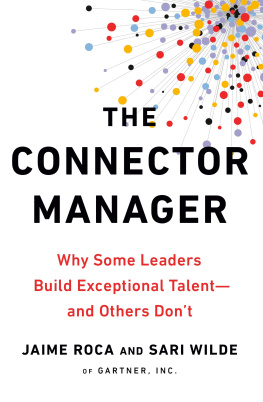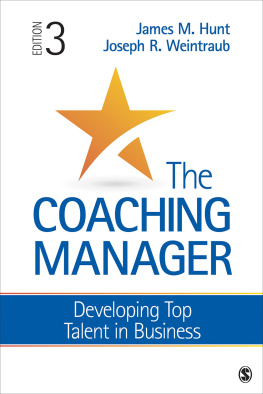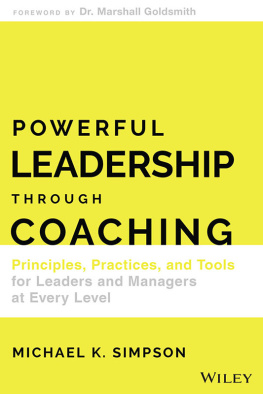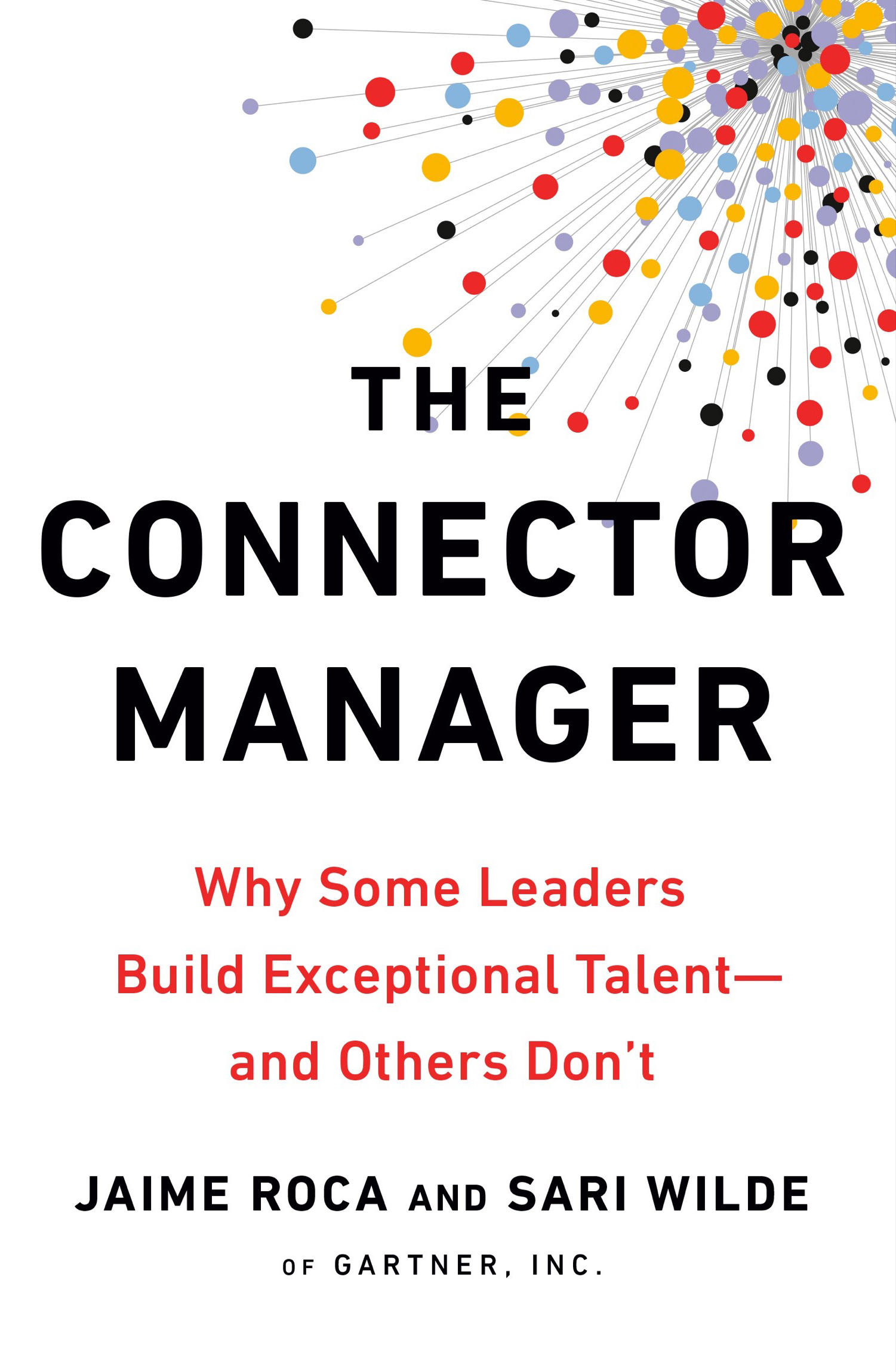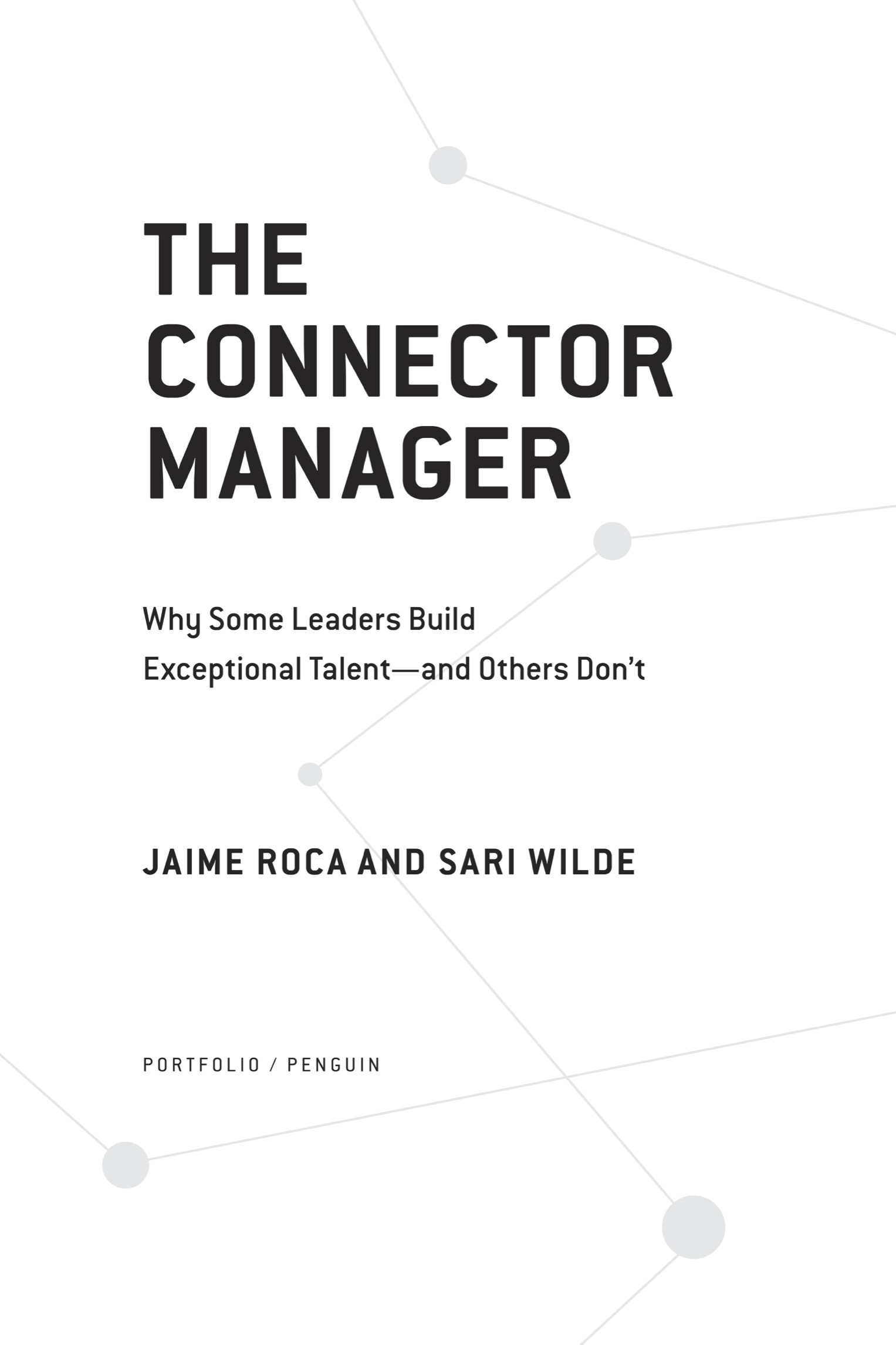Additional Praise for THE CONNECTOR MANAGER
Everybody knows that the best managers are the ones who deliver always-on feedback. But what if everybody is wrong? In The Connector Manager, Roca and Wilde deliver a death blow to the conventional management wisdom, arguing with convincing quantitative and qualitative data that always-on feedback isnt just an unproductive management approach, but a counterproductive one. This is a head-snapping and hugely engaging book that will make even the most seasoned leaders and management gurus question what they preach.
Matt Dixon, chief product and research officer at Tethr and coauthor of The Challenger Sale
The Connector Manager is a rare Ah Ha book. Youll be privy to the surprising practices of a small pool of managers who are exceptional talent developers. Whats more important is that you will learn the steps to becoming one yourself... and with remarkable efficiency in your busy day.
Jay A. Conger, coauthor of The High Potentials Advantage
The Connector Manager teaches leaders how to use the power of connections for development. Its a fantastic read that is both aspirational and actionable for leaders today.
Rob Cross, Edward A. Madden Professor of Global Leadership at Babson College and author of The Hidden Power of Social Networks
We teach our students that management can be a noble profession, and The Connector Manager provides a road map to that ambition. By describing the ways that such managers can have an outsize impact on their employees, their teams, and their entire organizations, the authors are really showing us how great managers can change the world.
Derek van Bever, senior lecturer and director at The Forum for Growth & Innovation at Harvard Business School

Portfolio / Penguin
An imprint of Penguin Random House LLC
penguinrandomhouse.com

Copyright 2019 by Gartner, Inc.
Penguin supports copyright. Copyright fuels creativity, encourages diverse voices, promotes free speech, and creates a vibrant culture. Thank you for buying an authorized edition of this book and for complying with copyright laws by not reproducing, scanning, or distributing any part of it in any form without permission. You are supporting writers and allowing Penguin to continue to publish books for every reader.
Library of Congress Cataloging-in-Publication Data
Names: Roca, Jaime, author. | Wilde, Sari, author.
Title: The connector manager : why some leaders build exceptional talent and others dont / Jaime Roca, Sari Wilde.
Description: First Edition. | New York : Portfolio, 2019. | Includes bibliographical references and index.
Identifiers: LCCN 2019019043 (print) | LCCN 2019021654 (ebook) | ISBN 9780593083833 (ebook) | ISBN 9780593083826 (hardcover)
Subjects: LCSH: Management. | LeadershipPsychological aspects. | Personnel management. | BISAC: BUSINESS & ECONOMICS / Management. | BUSINESS & ECONOMICS / Human Resources & Personnel Management. | BUSINESS & ECONOMICS / Workplace Culture.
Classification: LCC HD31.2 (ebook) | LCC HD31.2 .R623 2019 (print) | DDC 658.4/092dc23
LC record available at https://lccn.loc.gov/2019019043
Some names and identifying characteristics have been changed to protect the privacy of the individuals involved.
While the author has made every effort to provide accurate internet addresses and other contact information at the time of publication, neither the publisher nor the author assumes any responsibility for errors, or for changes that occur after publication. Further, the publisher does not have any control over and does not assume any responsibility for author or third-party websites or their content.
Cover based on a design by Glenn Thode
Cover image: Liuzishan / iStock / Getty Images Plus
Version_2
To our teams, who support us, challenge us, and inspire us to become better managers.
CONTENTS
INTRODUCTION
Its 3:21 on a Wednesday afternoon in San Francisco. Marta Romero walks back to her office from one of her many meetingsexhausted. She has nine minutes before her next meeting with one of her direct reports, Jon Goldberg, who has been having trouble with one of his projects. He is working on launching a new development application. Romero takes a deep breath and exhalesshe has been out of the weeds of development for a while and doesnt have the new technical knowledge to help him. She glances at her list of things to do for that day, which are increasing in number as the day progresses, and clicks control + alt + delete to wake up her computer. Thirty-two emails are waiting for her. Romero feels the tension of managing her own workload while simultaneously trying to coach her staff as they navigate all of their projectsmany that require skills and knowledge she doesnt have. She pauses for a minute and considers whether to push the meeting with Goldberg... again. She already rescheduled it earlier this month.
On any given day around the globe the plight of todays managers mirrors Romeros. Urgent tasks take precedence over an ever-expanding list of expectations and demands. To-do items, including coaching responsibilities, become as if wish listsand the world spins madly on. Something has to give, but what?
In many instances, like Romeros, the coaching and feedback interactions managers would like to have fall by the wayside. Beyond constant time constraints, many managers simply lack confidence in their ability to provide the right guidance across the increasing breadth and depth of employee activities. The result is that managers put off coaching, prioritizing so many other urgent activities, or just wing it when asked to help in areas where they lack expertise.
Until now, Romeros trajectory has been successful. Having climbed the ranks of her midsize technology company, from individual software developer to manager of a thirty-person team, Romero knows that a key to her own success is helping her team become more self-sufficient. She also knows that some work is just easier to do herself than pass along to others, even if it means that emerging tasks have to wait on the back burner until she has the time to get more involved. On a good day, Romero serves as the heart of her team, firing on all cylinders as a subject-matter expert and adviser to her employees. On a bad day, she leaves the office feeling guilty for failing to provide the guidance her employees need.
As research and advisory leaders at Gartner, we spend hundreds of hours every year speaking with senior executives globally, and we continually hear that manager development is a top priority. We know that the effectiveness of managers has a huge impact on employee performance, engagement, and business results across organizations of all sizes, industries, and geographiesand companies are making significant investments to elevate manager preparedness through training, coaching, and technology. In reality, regardless of these investments, our data consistently show that managers simply dont have what they need to succeed in todays fast-moving, ever-evolving environment.

